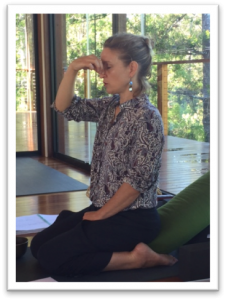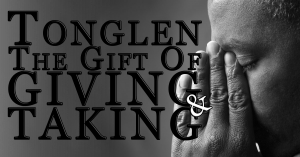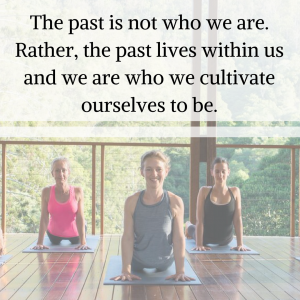Bring on the revolution – Epigenetics & The Karmic Fate of our Genes
The writing is not always on the wall. As technological advances continue to expand our understanding of what it means to be human, research begins to prove what ancient texts and prophetic leaders have taught for centuries – We are not tied to fatalism. Indeed, humanity is somewhat of a paradoxical continuum whereby the past is not who we are. Rather, the past lives within us and we are who we cultivate ourselves to be. There is a karmic fate, that can be understood as a force generated by action or a distinguishing emanation, which comes from a bidirectional compilation of nature and nurture within the complexity of the human being.
We have been delving into the depths of epigenetics and the karmic fate of our genes... Our last post was a brief introduction to the wonderful world of the biology of change and how we have the power to to create karmic change both individually and socially – at the level of our genes!
This post continues by taking a look through how to make changes to your environment and actions to empower changes within your self and your family.
So, tell me the more practical ways I can begin to cultivate positive karmic fate within my genes!
Below is a brief introduction to a few of the practice foundations you can begin to explore in order to cultivate epigenetic change; at the same time it must be noted that change is holistic, and with each aspect comes the mindful need to incorporate a continued and deepening practice as it relates to you over time.
-
Mindful and respectful sense making: Past, present, and future.
 When looking to make change at an epigenetic level, there is an integral need to look into and to make sense of our ancestor’s history – what were their experiences, relationships, hidden traumas, resilience, spiritual belief systems or worldviews; as well as to understand our past attachments to caregivers; our current attachments and adult relationship health; the relationship we have with our children; perceived purpose and place (self-worth); as well as your cultural identity, and how do you personally appreciate the information as it relates to you? In mindful awareness of our past and present, as well as how we view the future, we have the capacity to unveil the truth behind our personality traits and our predispositions to specific behavioural and psychological reactivity and response. Thus, opening an avenue towards mindful change – for if we live in a place of mindless confusion and nonsensical oblivion our wellbeing and the fate of our genes will remain stagnant in disease and disorder. (Learn more about sense making in times of trauma here)
When looking to make change at an epigenetic level, there is an integral need to look into and to make sense of our ancestor’s history – what were their experiences, relationships, hidden traumas, resilience, spiritual belief systems or worldviews; as well as to understand our past attachments to caregivers; our current attachments and adult relationship health; the relationship we have with our children; perceived purpose and place (self-worth); as well as your cultural identity, and how do you personally appreciate the information as it relates to you? In mindful awareness of our past and present, as well as how we view the future, we have the capacity to unveil the truth behind our personality traits and our predispositions to specific behavioural and psychological reactivity and response. Thus, opening an avenue towards mindful change – for if we live in a place of mindless confusion and nonsensical oblivion our wellbeing and the fate of our genes will remain stagnant in disease and disorder. (Learn more about sense making in times of trauma here)
-
Pay Attention to and Practice Pranayama
That is: breathe. The benefits of mindful awareness of the breath are extensive. As Patrick McKeown of Butekyo Clinic states, “The way we breathe influences functioning of airways, blood circulation and oxygen release to the cells…”
Further, through much research and indeed, with many experts within the field such as Dr. Sundar Balasubramanian and Patrick McKeown, it cannot be negated that the practice of Pranayama is the gateway to holistic wellbeing. Pranayama has been effective for over 3500 years as a holistic medicinal process, the term textually recorded first in the Rg Veda 1500BCE. Pranayama cultivates a circular continuum of growth that changes unconscious-breathing patterns, thus:
- Strengthening the Vagal nerve, increasing parasympathetic (relaxation) response
- It is the doorway to conscious control, allows for present moment thinking
- Increases body awareness and the ability to link mind to body
- Increases awareness of body-to-emotion, emotion-to-body response and the capacity to “feel” emotional sensation prior to reaction and behavioural action
- Increases positive affect, which has a reciprocal resilience affect
As shown through multiple practices (See this discussion), Pranayama is a healing force in the Yogic tradition that opens us all into more subtle layers of being, and existence. This is reflected in scientific research: The breath allows us access to our subtle life force. Breath is the manipulator of energy flow; it has the power to cultivate qualities of calmness, peace, lightness, comfort as well as attentiveness. We can breath our way to good health, to an integrated sense of being and the capacity to live a healthy, meditative, and connected life. (Learn more about Pranayama and the breath here)
-
Active Stress Reduction
 Though stress is complex and deserves much more space than what we allow here, there is no lack of evidence, both in modern medicine and ancient philosophy, that stress is detrimental to our holistic health and wellbeing. As we have come to acknowledge in the past, we live in an epoch of apprehension and disconnection that touches so many of our lives that there is an increased interest of stress as it relates to in the raising field of Psychoneuroimmunology (PNI). There is an abundance of literature (for example see here, here, and here) in which discussions of stress link to inflammation of the body and brain. Which in turn relates to minimising stress in order to make epigenetic changes – key inflammatory response genes have the potential to be “switched off”, thus decreasing the chances of more specific autoimmune and neoplastic disorders and disease in current and future generations.
Though stress is complex and deserves much more space than what we allow here, there is no lack of evidence, both in modern medicine and ancient philosophy, that stress is detrimental to our holistic health and wellbeing. As we have come to acknowledge in the past, we live in an epoch of apprehension and disconnection that touches so many of our lives that there is an increased interest of stress as it relates to in the raising field of Psychoneuroimmunology (PNI). There is an abundance of literature (for example see here, here, and here) in which discussions of stress link to inflammation of the body and brain. Which in turn relates to minimising stress in order to make epigenetic changes – key inflammatory response genes have the potential to be “switched off”, thus decreasing the chances of more specific autoimmune and neoplastic disorders and disease in current and future generations.
Furthermore, the above mentioned negative association to health relates to stress either physiologically or psychologically, or within the interplay of both. Therefore, both may have an imperative need for regulation in order to make lasting epigenetic change. Yoga, and meditation, takes the spotlight once again as a key regulator in many anxiety based disorders – yet, and although quite often our day to day stress and apprehension is not as severe as to name it “anxiety” or a “disorder” the evidence still indicates the benefits of yoga. Yoga is a time-tested method of psychological/physiological, mind/body awareness and regulation (through many measurable qualities such as a strengthened vagal nerve) that enhances self-efficacy and an internal locus of control – the main mechanisms of stress reduction. (Learn more about active stress reduction here)
-
Diet
 Holistic health and the karmic fate of our genes are held in a non-judgmental and unassuming look towards the things we can change within ourselves. This is done in order to promote an internal environment that enhances the body’s own capacity to live in balance and harmony. A primary aspect of change is, of course, what we eat. So much of our diets are filled with processed and “on the run” foods that may feel like they are filling us or giving us the energy we need, yet in reality they are but tricking our minds into satiety. One of the most effective ways to make any sort of health change, and this is inclusive of epigenetic change, is to ensure that nutrition is based in internal harmony and balance.
Holistic health and the karmic fate of our genes are held in a non-judgmental and unassuming look towards the things we can change within ourselves. This is done in order to promote an internal environment that enhances the body’s own capacity to live in balance and harmony. A primary aspect of change is, of course, what we eat. So much of our diets are filled with processed and “on the run” foods that may feel like they are filling us or giving us the energy we need, yet in reality they are but tricking our minds into satiety. One of the most effective ways to make any sort of health change, and this is inclusive of epigenetic change, is to ensure that nutrition is based in internal harmony and balance.
In fact, the effects of nutrition on our genetics have been well documented and publicized. Many studies were conducted and research followed through from the late 1940’s showing the effects the Dutch Hunger Winter had on subsequent generations. The studies unearthed documents from post WW2 in the Netherlands, and traced children born to pregnant women within the Hunger Winter and suffering malnutrition. The studies have shown that “Even though those individuals [the children birthed] had seemed perfectly healthy at birth, something had happened to their development in the womb that affected them for decades after. … Even more extraordinarily, some of these effects seem to be present in the children of this group, that is, in the grandchildren of the women who were malnourished during the first three months of their pregnancy” (Source)
From this research we see the imperative nature of nutrition and our regular diet. There is an abundance of benefits in choosing an Ayurvedic Diet as well as in addressing digestive health for increased wellbeing – the key may be in understanding your individual constitution and how specific foods can either hinder or help holistic health for yourself and thus for you future generations. (Learn more about digestive health here)
-
Sleep
 There is this notion in today’s society that sleep is something to be sacrificed – for work, for the little leisure time we have, and perhaps even for companionship. Bigger still, I do wonder even when there is an attempt to cultivate more sleep time – what is our quality of sleep truly like? Do our bodies even know how to sleep for rest? To sleep for rejuvenation? To allow the natural circadian rhythmicity and homeostatic sleep pressure in order to modulate functionality and create harmony in body, mind, and soul? The reality is, if we do not pay attention to our bodies physical needs of quality restorative sleep, our holistic being will suffer, and so to lasting changes within our cells. (Learn more about healthy and restorative sleep here)
There is this notion in today’s society that sleep is something to be sacrificed – for work, for the little leisure time we have, and perhaps even for companionship. Bigger still, I do wonder even when there is an attempt to cultivate more sleep time – what is our quality of sleep truly like? Do our bodies even know how to sleep for rest? To sleep for rejuvenation? To allow the natural circadian rhythmicity and homeostatic sleep pressure in order to modulate functionality and create harmony in body, mind, and soul? The reality is, if we do not pay attention to our bodies physical needs of quality restorative sleep, our holistic being will suffer, and so to lasting changes within our cells. (Learn more about healthy and restorative sleep here)
-
Awaken Compassion
 Altruism, though defiantly not a novel concept, in the past has shifted from dominant discourse creating a world of unnecessary pain and suffering. And though we may or may not recognise or feel the effects of an individualistic culture there is both ancient and modern records that recognise the effects altruism and compassion has at a cellular level. It is more than reasonable to equate the conscious and subconscious energy flow that emanates from a regular Tonglen practice (self and other compassion meditation) with epigenetic changes that have the capacity to change future societal behaviours in a positive direction. Perhaps the practicing of compassion and altruism you do today could have a diversity of change that ranges from the way, as a universal culture, we raise our children, to the way we treat our partners or spouses, the ways we respect others diverse natures, to the way in which we learn to be mindfully present and aware in gratitude of where we came from, who we are, and what we have. (Learn more about the imperative nature of compassion here).
Altruism, though defiantly not a novel concept, in the past has shifted from dominant discourse creating a world of unnecessary pain and suffering. And though we may or may not recognise or feel the effects of an individualistic culture there is both ancient and modern records that recognise the effects altruism and compassion has at a cellular level. It is more than reasonable to equate the conscious and subconscious energy flow that emanates from a regular Tonglen practice (self and other compassion meditation) with epigenetic changes that have the capacity to change future societal behaviours in a positive direction. Perhaps the practicing of compassion and altruism you do today could have a diversity of change that ranges from the way, as a universal culture, we raise our children, to the way we treat our partners or spouses, the ways we respect others diverse natures, to the way in which we learn to be mindfully present and aware in gratitude of where we came from, who we are, and what we have. (Learn more about the imperative nature of compassion here).
-
Pay Attention to the Ageing Process
Though it gets quite a bad wrap in today’s society, the ageing process is inevitable- it happens from the day we are conceived! Paying attention to it, is not about adding worry to your day, it is simply about a focus on wellness and the choices we make that affect the expression of our inherited genes. There is, once again, overwhelming information that often leads to misconception of causation as to the ageing process and the disorders and diseases of our relatives as fatalistic. Yet with new research comes the ability to pay attention to, and make appropriate changes that can in fact reduce the risk of age related illness, and once again, “switch off” the genes that may have come from past generations.
For example, in looking at the ageing process with a mindset of sustained wellness, rather then increasing illness, we can see that our ability to regulate the choices we make today can delay or even avoid the inevitable affects of aging. Meaning, in making conscious choices to change our lifestyle we can delay the onset of age related disease such as: memory loss and dementia, Alzheimer’s, arthritis, osteoporosis, heart disease, diabetes, influenza or pneumonia, cancer, respiratory diseases, and many more illnesses associated with ageing. (learn more about your inner potential and your true inner strength of change here).
As we have seen from the above five aspects of holistic health and wellbeing, what we do has a significant impact on who we are, and the karmic fate of our genes. Our ancestor’s experiences and choices may be within the codes of our DNA, however if science over the past decade has proven anything it is that humanity is a paradoxical continuum whereby the past is not who we are. Rather, the past lives within us and we are who we cultivate ourselves to be. The karmic fate of our genes is within the grasp of our control. And while it may not ultimately provide a clear cure for all disease and disorder, nor for the ailments that are beyond our control, what the understanding of epigenetics gives us, is that we are an empowered species. We live in a world of (and yes, albeit sometimes limited) choice, whereby what we do today has the ability to change tomorrow.
Understanding Epigenetics Further.
“Following completion of the sequencing of the human genome in 2003, the functional analysis of the human genetic code seemed to be a relatively straightforward task. In fact, notwithstanding the enormous progress in understanding the genetic basis of diseases and other traits made possible by the Human Genome Project, full understanding of human genetic processes has turned out to be far more complex than initially expected. Perhaps the most important of these complexities is epigenetics, which plays a major role in the expression of human genetic traits. From cancer to environmental toxicity to maternal behavioural effects to in vitro fertilization risks, epigenetic effects play an important, previously under-appreciated role in the interaction of nature and nurture to determine human traits.” (https://www.ncbi.nlm.nih.gov/pmc/articles/PMC3034450/)
“Not all genes are active at all times. DNA methylation is one of several epigenetic mechanisms that cells use to control gene expression.” (https://www.nature.com/scitable/topicpage/the-role-of-methylation-in-gene-expression-1070)
“The behavior of a person's genes doesn't just depend on the genes' DNA sequence - it's also affected by so-called epigenetic factors. Changes in these factors can play a critical role in disease. (https://www.nature.com/scitable/topicpage/Epigenetic-Influences-and-Disease-895#)
“Epigenetics involves genetic control by factors other than an individual's DNA sequence. Epigenetic changes can switch genes on or off and determine which proteins are transcribed.”
(https://www.nature.com/scitable/topicpage/Epigenetic-Influences-and-Disease-895#)
“The message of epigenetic medicine is clear; the factors that control the life cycle of an organism are both nature and nurture. “
(https://www.ncbi.nlm.nih.gov/pmc/articles/PMC3193653/)
“Epigenetic is a rapidly growing research field studying regulations of gene expression that do not change the DNA sequence. Knowledge about these mechanisms is still uncertain in many respects, but main presumptions are that they are triggered by environmental factors and life style and, to a certain extent, heritable to subsequent generations, thereby reminding of aspects of Lamarckism. Epigenetic research advances give rise to intriguing challenges for responsibility relations between the society and the individual.” (https://link.springer.com/article/10.1007/s12376-011-0072-6)
“Cells are the basic building blocks of tissues. All cells experience changes with aging. They become larger and are less able to divide and multiply. Among other changes, there is an increase in pigments and fatty substances inside the cell (lipids). Many cells lose their ability to function, or they begin to function abnormally.” (https://medlineplus.gov/ency/article/004012.htm)
“Genome variations are differences in the sequence of DNA from one person to the next. Just as you can look at two people and tell that they are different, you could, with the proper chemicals and laboratory equipment, look at the genomes of two people and tell that they are different, too. In fact, people are unique in large part because their genomes are unique.” (http://www.genomenewsnetwork.org/resources/whats_a_genome/Chp4_1.shtml)
“The epigenome is influenced by environmental factors throughout life. Nutritional factors can have profound effects on the expression of specific genes by epigenetic modification, and these may be passed on to subsequent generations with potentially detrimental effects” (http://www.joponline.org/doi/abs/10.1902/jop.2008.080172)
“Ayurveda restores the innate intelligence of the body and awareness for healing. Homeostatic factors are ingrained in the blueprint for life. Meddling with the laws of nature can result in detours on the path to optimal health. Ayurvedic therapies can affect both the genetic and phenotypic expression of life. Research efforts into Ayurvedic modalities and herbal preparations should include how epigenetic mechanisms are altered in target tissues or in the immune cells. Potential new pathways of cellular and molecular functioning may be discovered in the process of evaluating Ayurvedic approaches. Ayurveda can be appreciated through the science of epigenetics, covering the manifested expression of life, and how to maintain and improve the health of the individual. The epigenetic factors in life affect the phenotype in a positive or negative way, and indirectly affect the genetic expression in a positive or negative way, which can be transmitted to the progeny. Ayurveda covers both aspects of life – genetic and phenotypic – and is a comprehensive, holistic, and personalized system of health care"(https://www.ncbi.nlm.nih.gov/pmc/articles/PMC5688840/)




